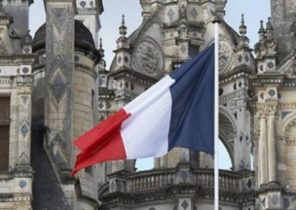When Patrick and Enitan Goredema booked tickets from Toronto to Tbilisi, where they were supposed to arrive on March 19 to attend the birth of his surrogate child, they had no idea what awaited them. The day before their arrival flight via Rome Georgia closed its airports as a quarantine measure against the novel coronavirus.
“At first we thought that we would wait two to three weeks for everything to calm down, but it’s turned into a nightmare, — said Patrick, who, with the assistance of the Agency that provided them with the services of a surrogate mother, contact the Embassy of Georgia in Canada to obtain a special permit to enter the country.
When, on 3 April, was born their son, the couple fell into despair. “For us, it was just awful, — said Patrick. The first week was rather difficult, because my wife cried every day, her nightmares, and she’d always ask, who will feed our baby. […] We had whatever it was to get to Georgia.”
Georgia is becoming an increasingly popular destination for parents in need of the services of a surrogate mother willing to carry their biological child. Packages surrogacy costs from 25 thousand dollars, which is much cheaper than in the United States is the only developed country where commercial surrogacy is legal, but is it worth over 100 thousand dollars. Also in favor of Georgia operates a simplified visa regime that allows the citizens of the 98 countries are easy to enter and reside in the country for up to 12 months, as well as the law that allows you to record the names of the parents, who intended the child directly in his birth certificate.
Surrogacy in Georgia is legalized in 1997 for heterosexual couples with fertility disorders, but this sphere is not regulated and there was no formal system of registration of such births is reported according to the Deputy public defender of Georgia Catherine Chiladze.
Goredema for the couple, who are canadian citizens Zimbabwean and Nigerian origin, the desire to become parents has become a Saga of a decade, including several failed cycles of intrauterine insemination and in vitro fertilization. Then they decided to try surrogacy is the process in which their sperm and egg fertilized in the laboratory and the resulting embryo implanted in a surrogate uterus. The couple initially considered Mexico, but eventually made a choice in favor of Georgia, as the thought that the medical facilities and legal conditions here are better.
Although they managed to obtain permission from the Ministry of foreign Affairs of Georgia to enter the country, to negotiate with hospitals in Canada to test covid-19 to be allowed on the flight, took more than a month. Then they had to look for it is becoming increasingly rare for a connecting flight on which the “Georgian airlines” has taken Georgian citizens home. Eventually they moved to Tbilisi via Minsk, 4 may — the day after their son turned a month.
The surrogate mother of their child who was just called Ana, said that he is very worried about the birth during quarantine in connection with the pandemic.
“I was ready to do everything for the child, though in our contract it says that I should not engage him in any kind of contact after birth,” said Ana. This time I thought a lot about how the child is in the hospital with no parents.”
Ana, a single mother with two children in adolescence, acts as a surrogate mother for the second time. As a fee-for-service it receives 15 thousand 600 dollars, almost three times the average annual salary in Georgia. According to her, she did it for financial reasons, but also because he gets satisfaction in helping childless couples.
Stuck in hospitals babies
Contact with four of the 10 agencies surrogacy, local phone number, which managed to find in the Internet, found out that in Georgia, separated from their parents were at least 40 children, 30 of them in the clinic, “Chachava”, one of the oldest maternity hospitals in Georgia began to provide services of a surrogate mother in 2014. The remaining agencies are either not picked up or refused to comment, indicating that in fact these figures may be higher.
American Ilana Bar Didone, founded in Tbilisi Surrogacy Agency Royal, said they are doing everything possible to take care of six babies born to parents from the United States and Israel through their Agency, including the provision of personal nannies, who spent 14 days in isolation.
Several other children stuck in hospitals where they were born. Take care of hospital staff, because I do not have the necessary documents to transfer to the Trustees. Among them are children of parents from China, India and Portugal.
Earlier this month, the newspaper “new York times” reported that hundreds of children born to surrogate mothers, was stranded in Ukraine.
But popular Georgian surrogacy, New Life Agency, which usually organizes about 20 births a month, managed to avoid such a situation, said Sophie Ukleba, working there as a senior Manager.
“As soon as we found out in early March about possible travel restrictions, we contacted all parents expecting children in the next three months, and told them on the next flight to go [to Georgia]. Most of them arrived in time,” she said. The Agency had only one child, a baby couple Goredema, — born before arrival of parents, and in early June it is expected two more children, whose parents still can’t get into the country.
According to Sophie Ukleba, Ministry of foreign Affairs of Georgia was very helpful, giving parents special permission to visit the country, despite a strict ban on the entry of foreign nationals on March 18. “This country has helped more parents than their own country,” she said.
For the couple Goredema, which finally reunited with his son after the mandatory 14-day quarantine, endured hardships almost forgotten. Patrick says that he is very thankful to the people who cared about their son in their absence.
“I’m a black man and my wife is a black woman, and we went on surrogacy, so our baby was a Georgian, white woman. And for us it is a gift that no one else can give, and we will always be grateful to his mother, vinosense our child”.
Pearly Jacob is a freelance journalist and filmmaker working in Tbilisi.







